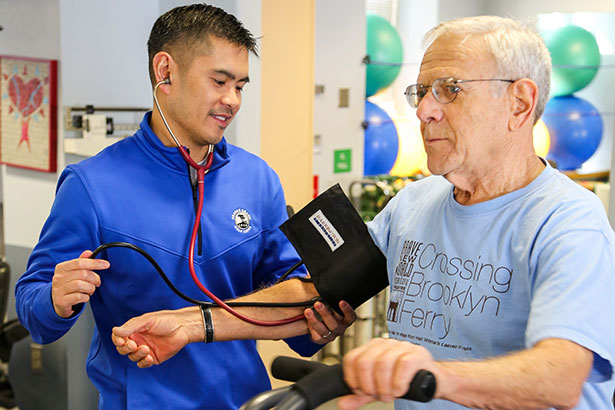
Physicians often unaware of rehab’s benefits
Although it’s impossible to rewrite the past, patients who have suffered from myocardial infarction, angioplasty, heart surgery or heart failure have the opportunity to improve the future. The key is cardiac rehabilitation. Medicare and all major insurance carriers cover a 12-week cardiac rehab program for patients with coronary artery disease, congestive heart disease with a low ejection fraction, or after bypass or valve surgery.

“It’s enormously beneficial and terribly underutilized,” said Samuel Suede, MD, section chief of cardiology and medical director of cardiac rehabilitation at Englewood Hospital and Medical Center. In fact, Dr. Suede cited numbers that the five-year mortality rate drops between 20% and 30% for patients who follow a prescribed cardiac rehabilitation program, yet only 20% to 30% of the eligible population enrolls in one.
“There’s a combination of factors that keeps the numbers low: from physicians who are unaware, so they don’t make a recommendation for cardiac rehabilitation, to patients who are resistant to starting an exercise regimen,” Dr. Suede said.
The Englewood Hospital cardiac rehabilitation center addresses patient apathy and maintains long working hours that can accommodate most patients’ schedules. The center’s staff works with patients one-on-one and coaches patients on every aspect of their well-being, including nutrition, stress management, and physical activity. The center also offers a comprehensive program with state-of-the-art exercise equipment.
“We really want to get a patient in as soon as they’re discharged,” Dr. Suede said. “So we’ve set up a comfortable and inviting atmosphere. We have experienced nurses and exercise physiologists who work closely with the patients. The staff is there for them and keeps them motivated and focused.”
The one-on-one setting allows the staff to educate patients in an intimate setting about their disease, risk factors, and lifestyle. “The program is customized for every single patient,” Dr. Suede said. “We customize the exercise program for anyone who has a neurological or orthopedic limitation.”
The care the staff puts into each patient leads to a very low dropout rate, Dr. Suede said. In fact, the program that the cardiac rehabilitation center created is so effective at stabilizing and reversing risk factors for heart disease and improving endurance and mobility that many patients choose to continue participating in the maintenance program after their insurance coverage lapses.
Dr. Suede reiterates the benefits of cardiac rehabilitation: Patients can return to their normal activity level sooner; their disease state is managed better; and with continuous exercise, their sense of wellness and mortality is improved.
Dr. Suede said he wishes more physicians referred their patients to cardiac rehab programs and more patients found the time and discipline to participate in cardiac rehab programs, given all of the benefits seen with Englewood Hospital’s cardiac rehabilitation center. “What could be better than a fully covered program that improves wellness and mortality?” he asked.
Posted September 2017
Physicians often unaware of rehab’s benefits
